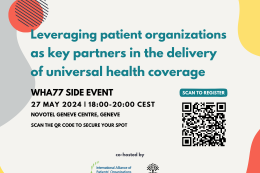Why the right information upon diagnosis is essential

Without support from clear, accessible, relevant and reliable health information, it is virtually impossible for patients to understand, be involved in, and make informed decisions about their health, wellbeing, treatment and care.
Yet, despite acceptance in the health and care community about the importance of access to information, there still exists substantial variation in the quality and consistency of information available to patients.
Over the last year Patient Information Forum has held a series of conversations with long-term condition patients in the UK, to understand their experiences of being provided with health information, and what opportunities exist to improve how information can support and empower them. From the conversations, they have identified the following six key points:1. Information on first diagnosis is essential
A repeated concern was the lack of appropriate information provided to patients upon first diagnosis.
For many people we spoke to, the issue was the total absence of information provided. Others explained how the information they were provided with was entirely inappropriate for them, for example it was age-inappropriate, or used language that was either too simplistic or too clinical.
It was clear that information could play a vital role in easing some of the initial fear involved in a new diagnosis, as well as supporting a better understanding of the potential impact of the diagnosis on people’s lives.
2. Information on first diagnosis can also be overwhelming
While information upon first diagnosis was considered vital, it was also clear it is not always the ideal point at which to either impart or comprehend the full array of information a patient needs in order to play an active role in their care.
‘When I was first diagnosed, it was such a shock that I couldn’t take anything in. I felt like I wanted to have all the information there possibly was but, looking back, I didn’t comprehend any of it because of the trauma of the diagnosis. It took me months to get to the position where I was able to begin to better inform myself.’
A sequenced approach, depending on the needs of the individual patient, was felt to be more helpful.
3. Information needs change as people move along the pathway
It was clear that participants, as they move along the patient pathway and better understand their condition, require different levels of information.
One participant spoke of how living with and getting to know a long-term condition was like studying a language:
‘At first you feel a bit lost and confused, but you eventually learn the basics, then you get a bit better, then you end up fluent. Information about my condition is the same; at first I needed the basics but I’m now pretty much an expert and so the information I needed 5 years ago, isn’t the same information I need now.’
Many people we spoke to felt the information they were provided with had not kept pace with their own development, and it was difficult to access the more ‘expert’ information they needed today.
4. There are certain, shared points along each patient pathway where information is essential
Each patient is an individual, and each patient journey is distinct, however it was clear from all participants that there are definite points at which access to information becomes of even greater importance.
As well as upon diagnosis, other key points include when there is any change or deterioration in the condition, and any point at which a decision has to be made related to changes in treatment or care.
Participants spoke of the importance of being provided with information ahead of the point at which the decision needed to be made.
‘I put on 6 stone because of the drugs I was taking and had to get a gastric band. I wasn’t told that. I wasn’t told how the drugs I was put on might affect my future.’
5. It’s obvious, but information must be tailored to the needs of the individual
Many of our participants spoke of their perception that a ‘one size fits all’ approach is sometimes taken to the provision of information, which was not helpful to enabling them play an active role in their care.
‘I’m of working age, but my condition usually affects people who are much, much older. The information I’ve been given has been totally useless to me. I need to know about the impact on my ability to work and bring up my family, but I haven’t ever really been provided with that and it’s been left to me to find out.’
6. Being supported to ask questions is vitalFor many people we spoke to, being supported to ask questions was regarded as a vital component in ensuring access to the information they need and fostering shared decision-making. For example being reminded to have three questions prepared, or by being given test results in advance of consultations.
‘I’ve been in so many consultations where I didn’t really understand what was being said, and if I hadn’t asked questions I’d have been left totally misinformed.’ You can read more about our ‘Perfect Patient Information Journey Project’ on the PIF website here.
PIF is a UK-based network that champions the importance of high quality health information support for patients, carers, service users and the public. www.pifonline.org.uk



